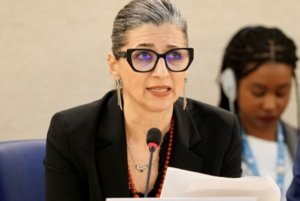End of empathy: Did the Gaza genocide render the UN irrelevant?

UN Special Rapporteur on the Situation in Palestine Francesca Albanese
Ramzy Baroud writes in The Palestine Chronicle on 17 November 2024:
Francesca Albanese did not mince her words. In a strongly worded speech at the United Nations General Assembly Third Committee on October 29, the UN Special Rapporteur deviated from the typical line of other UN officials. She directed her statements to those in attendance.
“Is it possible that after 42,000 people killed, you cannot empathize with the Palestinians?” Albanese said in her statement about the need to “recognize (Israel’s war on Gaza) as a genocide”. “Those of you who have not uttered a word about what is happening in Gaza demonstrate that empathy has evaporated from this room,” she added.
Was Albanese too idealistic when she chose to appeal to empathy, which, in her words, represents “the glue that makes us stand united as humanity”?
The answer largely depends on how we wish to define the role being played by the UN and its various institutions; whether its global platform was established as a guarantor of peace, or as a political club for those with military might and political power to impose their agendas on the rest of the world?
Albanese is not the first person to express deep frustration with the institutional, let alone the moral collapse of the UN, or the inability of the institution to affect any kind of tangible change, especially during times of great crises.
The UN’s own Secretary-General Antonio Guterres himself had accused the executive branch of the UN, the Security Council, of being “outdated”, “unfair” and an “ineffective system”.
“The truth is that the Security Council has systematically failed in relation to the capacity to put an end to the most dramatic conflicts that we face today,” he said, referring to “Sudan, Gaza, Ukraine”. Also, although noting that “The UN is not the Security Council”, Guterres acknowledged that all UN bodies “suffer from the fact that the people look at them and think, ‘Well, but the Security Council has failed us.’”
